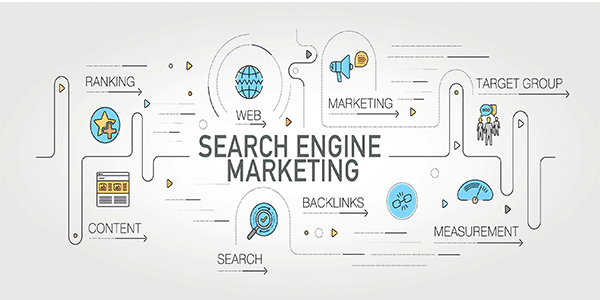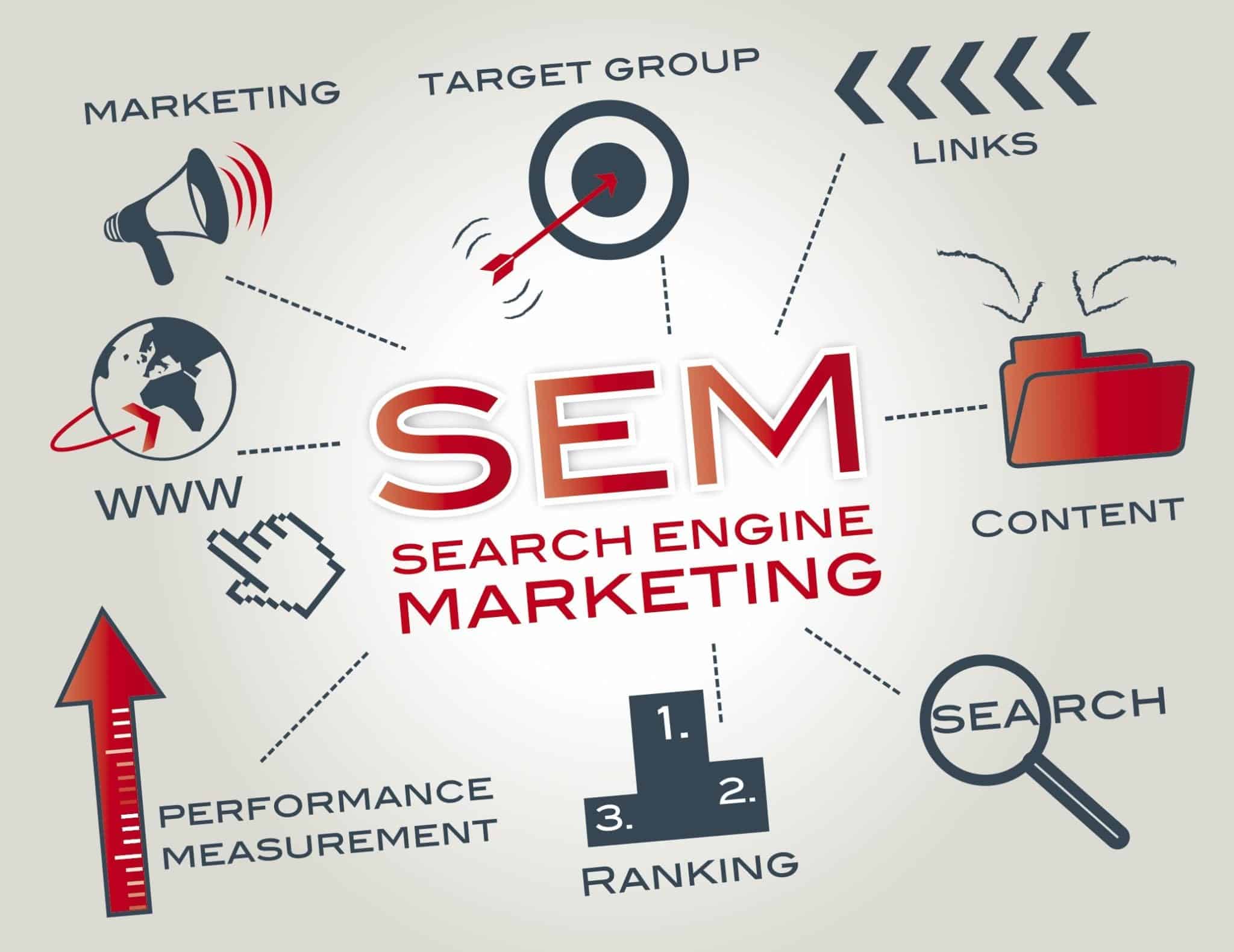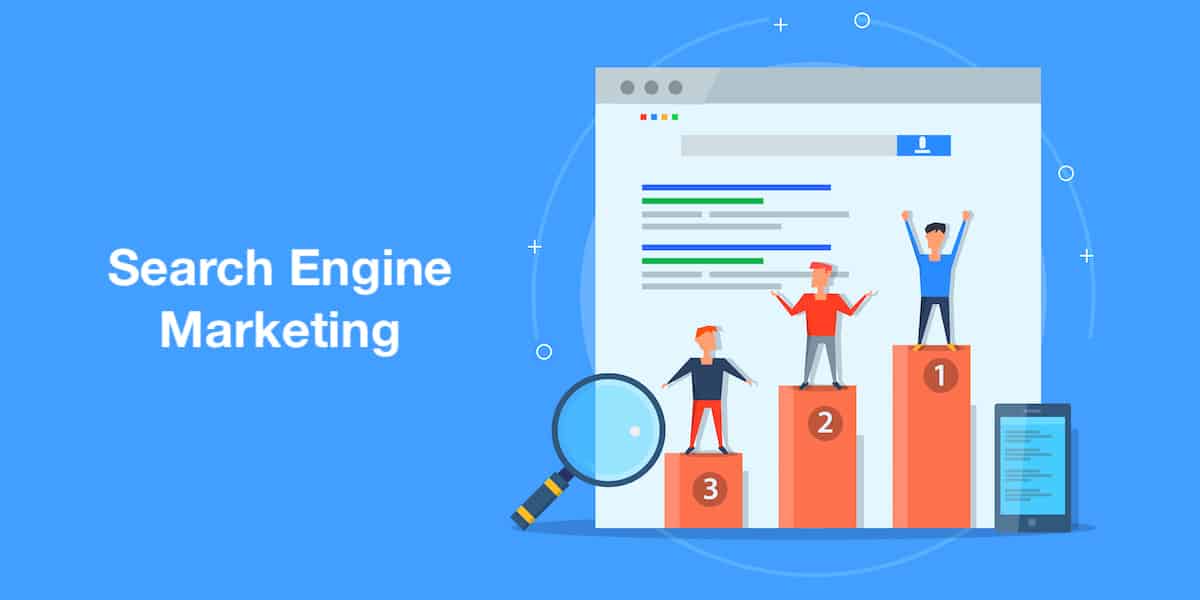What is Search Engine Marketing?
Search engine marketing (SEM) is a digital marketing strategy that is used to increase the visibility of a website or page in search engine results pages (also referred to as SERPS).
Before, search engine marketing referred to both organic search activities like search engine optimization (SEO) and paid activities like purchasing ads and creating ad campaigns. Today, however, whenever you see search engine marketing, you can be sure that it refers almost exclusively to paid search advertising or pay per click (PPC).
In short, search engine marketing includes many SEO tactics and practices but how they are used defines the differences between the strategies.

Why is Search Engine Marketing Important?
The Internet has made shopping for products and services easier than ever before because you can research everything you’re looking for before you buy. With so many consumers turning to the Web to research and shop for products online, search engine marketing is a logical strategy for bringing potential customers to your company. In fact, because most commerce practices now take place online, search engine marketing has become a highly important strategy for all company’s hoping to increase and lengthen their reach and sphere of influence.
Most people find new businesses online after presenting a search query to a search engine. With this in mind, businesses need to meet their potential customers where they are and make their presence online much more palpable. Search engine marketing is the best way to bridge the gap between traditional advertising and advertising online.
In SEM, advertisers only have to worry about paying for impressions that result in visitors. This means that a company is spending its marketing dollars wisely while keeping out of the danger of having money and resources wasted. In addition to this, each visitor that does come to your site or landing page actually improves the website’s rankings in organic search results.
Keeping in mind that most consumers and Internet users use search queries to specifically help them find information of a commercial nature, it stands to reason that these same searchers are in the perfect position to receive marketing messages and promptings online. These can come in the form of advertisements that are triggered only when a certain search query is submitted – a feature that can be found with Google AdWords and other solutions.
The best part of search engine marketing is that the strategy reaches the right consumers at the right time. When they are searching for new information, SEM springs into action in a non-intrusive, highly helpful and effective way. With search engine marketing, your business can enjoy immediate results.

How Does Search Engine Marketing Work?
Search engine marketing is the result of some complicated algorithms that make sure the most relevant results are returned after every search. Location, demographic, and other available information play a part in returning only the most relevant results for a query possible.
In paid research advertising, sponsored ads typically appear at the top and sides of a search engine results page to gain more visibility and prominence than the organic results. These advertisements are often eye-catching in some way (flashy, colorful, large, using enthusiastic text, etc) to make a click-through more likely.
Some ads are only triggered by certain keywords, meaning that searchers won’t see them unless they’ve entered the right keyword, phrase, or combination of words and phrases into their search engine.
This can lower the pool of potential customers, but it also ensures that every searcher who sees your ad is the right person. When ads appear in prominent locations on a SERP and match a searcher’s keywords, the searcher is much more likely to engage with the ad and click-through to your site.
To help your SEM strategy, use search ad networks as resources. Two of the most prominent networks are Google AdWords and Bing Ads. Depending on your site, the type of analytics you use, and the ad campaign you’re trying to run, chances are that these platforms will equip you with the tools you need to make your SEM strategy a success.

How is Search Engine Marketing Different from SEO?
SEM and SEO have one main difference that marketers should know: search engine optimization is actually a component of search engine marketing. This means that search engine marketing will always include components of paid search (pay-per-click, ads and ad campaigns, social media marketing, etc), while search engine optimization relies on more focused actions to produce organic (not paid for) results.
Still, you can use SEO as a part of SEM because optimizing keywords and doing keywords research can take your overall marketing strategy to new heights. When you optimize your content and then implement search engine marketing to make a difference in your content’s visibility and rank, SEO then makes it possible for your website, landing page, blog, or other pieces of web content to rank higher on certain SERPs for certain queries.
When the main goal is to reach your target audience, blatant visibility (i.e. being seen by everyone, whether they’re part of your target audience or not) is not helpful. You want the right searchers to see your business because that searcher can become a lead, and then a conversion. Search engine marketing makes it possible to streamline the optimization process for optimal results.

Having issues generating leads? You deserve better! As one of the top PPC agencies in the world, we understand how to generate higher amounts of leads at a lower cost to you. Get a free proposal from us today and we can show you how your website is measuring up amongst the competition!
More Resources